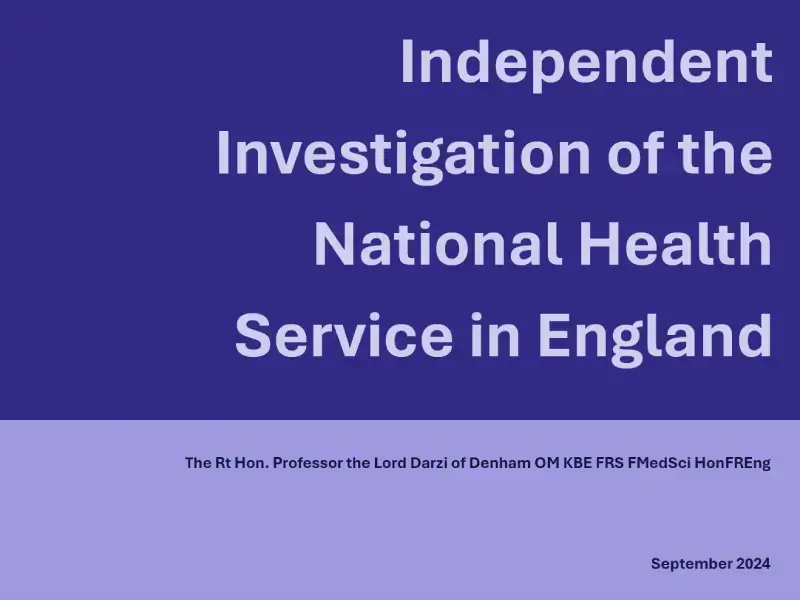Independent investigation of the NHS
Lord Darzi has published an independent investigation of the NHS today.
The report focuses on a comprehensive analysis of the NHS, evaluating its performance, challenges, and recommendations for the future.
We’ve read it and provide a simplified summary of its main points below:
Key Findings:
1. The NHS is in Serious Trouble:
Public satisfaction is at an all-time low, and while NHS staff are working hard, the system faces immense challenges that have worsened over time.
2. Worsening Health of the Nation:
Life expectancy increased in the early 2000s but plateaued in the 2010s and declined during the COVID-19 pandemic. Issues like poor housing, rising poverty, and unhealthy lifestyles have driven a rise in long-term health conditions.
3. Access and Waiting Times:
Across the board, patients are facing longer waits to see GPs, access mental health services, and receive emergency care. As of 2024, over a million people were waiting for community services, and more than a million were on waiting lists for mental health support.
4. Quality of Care:
Once patients access care, the quality is generally high, though there are notable issues in specific areas like maternity care. For example, maternity care has seen scandals due to high mortality rates and significant health inequalities, particularly among Black women.
5. Challenges in Specific Areas:
- A&E: Waiting times in emergency departments have worsened dramatically. By 2024, 60% of people were not seen within the four-hour target, compared to 94% in 2010.
- Cancer Care: Cancer survival rates have improved, but the UK still lags behind other countries. The target for treatment within 62 days of referral has not been met since 2015.
- Cardiovascular Care: After years of improvement, mortality rates for cardiovascular disease have begun to rise again.
6. Workforce Pressures:
GPs are overworked, and there are large variations in the number of patients per GP. Mental health nurses and community staff are in short supply, with mental health referrals increasing dramatically, especially for children and young people.
7. Financial and Structural Issues:
NHS funding has not kept pace with increasing demands, and hospitals are facing backlogs in maintenance, outdated equipment, and insufficient capital investment. The lack of integration between the NHS and social care exacerbates these problems.
Recommendations for the Future:
- Re-engage Staff and Empower Patients: NHS staff remain highly committed, and their potential must be harnessed for improvement. Patients should also be more empowered in their care.
- Shift Care Closer to Home: There needs to be a stronger emphasis on general practice, mental health, and community services to relieve pressure on hospitals.
- Increase Productivity in Hospitals: This will involve better operational management, investment in modern infrastructure, and better staff engagement.
- Leverage Technology: Greater adoption of technology and digital systems is crucial, especially AI and life sciences innovations.
Conclusion
The NHS is in a critical state but retains strong “vital signs” such as dedicated staff and high-quality clinical care. However, substantial reforms are needed to address long-standing issues, and rebuilding will take time.
For more details on each of the above sections, read the full report, which provides an in-depth analysis of the NHS’s current state and future direction. It can be found on the Gov.uk website or by clicking the button below.
Read the reportWritten by Alisha Butler, Solicitor Advocate, and Director with over 25 years of experience in law.
If you or anyone you know has suffered from clinical negligence, get in touch with our expert team today.
Call now on 0151 3063694 or email: ab@phoenixlegalsolicitors.co.uk
